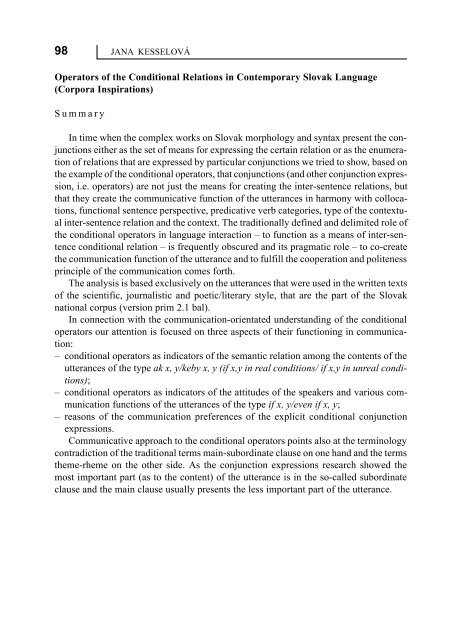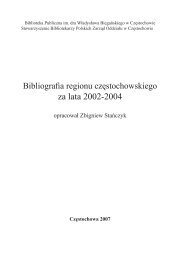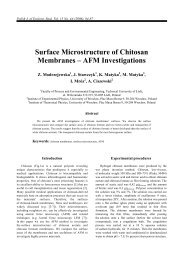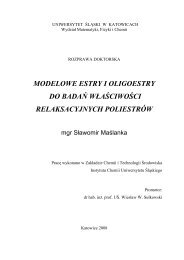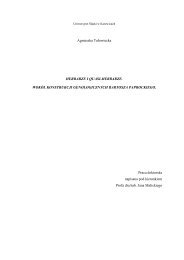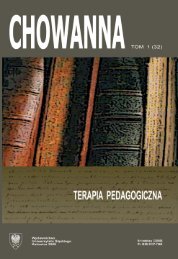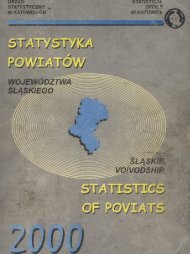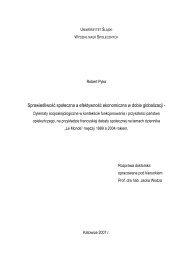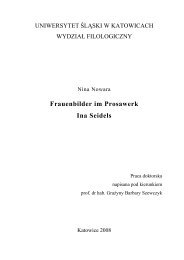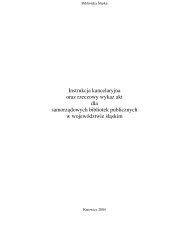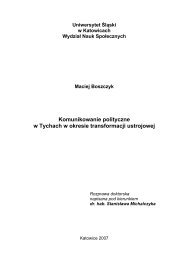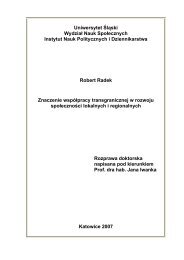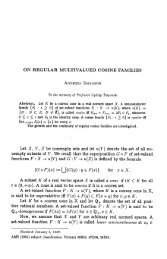- Page 2:
Jêzykizachodnios³owiañskiew XXI
- Page 5 and 6:
Redaktor serii: Jêzykoznawstwo Pol
- Page 7 and 8:
6 Spis treœciIWONA LOEWEPole gatun
- Page 10:
Od redaktorekPrze³om wieków, a zw
- Page 13 and 14:
12 EWA BI£AS-PLESZAK, KATARZYNA SU
- Page 15 and 16:
14 EWA BI£AS-PLESZAK, KATARZYNA SU
- Page 17 and 18:
16 EWA BI£AS-PLESZAK, KATARZYNA SU
- Page 19 and 20:
18 EWA BI£AS-PLESZAK, KATARZYNA SU
- Page 21 and 22:
20 EWA BI£AS-PLESZAK, KATARZYNA SU
- Page 23 and 24:
22 EWA BI£AS-PLESZAK, KATARZYNA SU
- Page 25 and 26:
24 EWA BI£AS-PLESZAK, KATARZYNA SU
- Page 27 and 28:
26 EWA BI£AS-PLESZAK, KATARZYNA SU
- Page 29 and 30:
28 EWA BI£AS-PLESZAK, KATARZYNA SU
- Page 31 and 32:
30 EWA BI£AS-PLESZAK, KATARZYNA SU
- Page 33 and 34:
32 EWA BI£AS-PLESZAK, KATARZYNA SU
- Page 35 and 36:
34 EVA ÈULENOVÁsov myslenia a aso
- Page 37 and 38:
36 EVA ÈULENOVÁPoznamenávame, ž
- Page 39 and 40:
38 EVA ÈULENOVÁVýsledok analýzy
- Page 41 and 42:
40 EVA ÈULENOVÁPodnet pre usudzov
- Page 44 and 45:
Hierarchicky vyššie zrakové obla
- Page 46 and 47:
Dedukcia a indukcia v medzi¾udskej
- Page 48 and 49: ZDENKO DOBRÍKKatedra germanistiky,
- Page 50 and 51: Klasifikácia anglicizmov a oblasti
- Page 52 and 53: Klasifikácia anglicizmov a oblasti
- Page 54 and 55: Klasifikácia anglicizmov a oblasti
- Page 56 and 57: Klasifikácia anglicizmov a oblasti
- Page 58 and 59: Wp³ywy obce w leksyce polskiej ko
- Page 60 and 61: Wp³ywy obce w leksyce polskiej ko
- Page 62 and 63: Wp³ywy obce w leksyce polskiej ko
- Page 64 and 65: Wp³ywy obce w leksyce polskiej ko
- Page 66 and 67: Wp³ywy obce w leksyce polskiej ko
- Page 68 and 69: Wp³ywy obce w leksyce polskiej ko
- Page 70 and 71: Wp³ywy obce w leksyce polskiej ko
- Page 72 and 73: EVA JANDOVÁOstravská univerzita v
- Page 74 and 75: Tematická výstavba jednoho dílè
- Page 76 and 77: Tematická výstavba jednoho dílè
- Page 78 and 79: Tematická výstavba jednoho dílè
- Page 80 and 81: Tematická výstavba jednoho dílè
- Page 82 and 83: Tematická výstavba jednoho dílè
- Page 84 and 85: Tematická výstavba jednoho dílè
- Page 86 and 87: Tematická výstavba jednoho dílè
- Page 88 and 89: JANA KESSELOVÁFakulta humanitných
- Page 90 and 91: Operátory podmienkových vzahov v
- Page 92 and 93: Operátory podmienkových vzahov v
- Page 94 and 95: Operátory podmienkových vzahov v
- Page 96 and 97: Operátory podmienkových vzahov v
- Page 100 and 101: JAROMÍR KRŠKOFakulta humanitných
- Page 102 and 103: Vzahové modely slovenských hydron
- Page 104 and 105: Vzahové modely slovenských hydron
- Page 106 and 107: Vzahové modely slovenských hydron
- Page 108 and 109: Vzahové modely slovenských hydron
- Page 110 and 111: MARIOLA LISZOKOVÁOstravská univer
- Page 112 and 113: Pøíjmení préteritálního typu
- Page 114 and 115: Pøíjmení préteritálního typu
- Page 116 and 117: Pøíjmení préteritálního typu
- Page 118 and 119: Pøíjmení préteritálního typu
- Page 120 and 121: Pøíjmení préteritálního typu
- Page 122 and 123: Pole gatunkowe streszczenia121Wœr
- Page 124 and 125: Pole gatunkowe streszczenia123tak s
- Page 126 and 127: Pole gatunkowe streszczenia125. skr
- Page 128 and 129: Pole gatunkowe streszczenia127ró¿
- Page 130 and 131: Pole gatunkowe streszczenia129w 196
- Page 132 and 133: Pole gatunkowe streszczenia131DANEK
- Page 134 and 135: HANA MAREŠOVÁUniverzita Palackéh
- Page 136 and 137: K souèasné jazykové situaci èes
- Page 138 and 139: K souèasné jazykové situaci èes
- Page 140 and 141: K souèasné jazykové situaci èes
- Page 142 and 143: K souèasné jazykové situaci èes
- Page 144 and 145: K souèasné jazykové situaci èes
- Page 146 and 147: MILOŠ MLÈOCHUniverzita Palackého
- Page 148 and 149:
Kolokaèní frazémy a idiomy v sou
- Page 150 and 151:
Kolokaèní frazémy a idiomy v sou
- Page 152 and 153:
Kolokaèní frazémy a idiomy v sou
- Page 154 and 155:
Kolokaèní frazémy a idiomy v sou
- Page 156 and 157:
„Mowa reklamowa”, czyli o rekla
- Page 158 and 159:
„Mowa reklamowa”, czyli o rekla
- Page 160 and 161:
„Mowa reklamowa”, czyli o rekla
- Page 162 and 163:
„Mowa reklamowa”, czyli o rekla
- Page 164 and 165:
PAVOL ODALOŠUniverzita Mateja Bela
- Page 166 and 167:
Literáronymá v Ballekovom Èudnom
- Page 168 and 169:
Literáronymá v Ballekovom Èudnom
- Page 170 and 171:
Literáronymá v Ballekovom Èudnom
- Page 172 and 173:
Literáronymá v Ballekovom Èudnom
- Page 174 and 175:
Literáronymá v Ballekovom Èudnom
- Page 176 and 177:
MARCEL OLŠIAKUniversytet Konstanty
- Page 178 and 179:
Variabilita suprasegmentálnych jav
- Page 180 and 181:
Variabilita suprasegmentálnych jav
- Page 182 and 183:
Variabilita suprasegmentálnych jav
- Page 184 and 185:
Byt ukryty w kolorach (na podstawie
- Page 186 and 187:
Byt ukryty w kolorach (na podstawie
- Page 188 and 189:
Byt ukryty w kolorach (na podstawie
- Page 190 and 191:
Byt ukryty w kolorach (na podstawie
- Page 192 and 193:
Byt ukryty w kolorach (na podstawie
- Page 194 and 195:
Pomlèka ako signál rozhrania roma
- Page 196 and 197:
Pomlèka ako signál rozhrania roma
- Page 198 and 199:
Pomlèka ako signál rozhrania roma
- Page 200 and 201:
Pomlèka ako signál rozhrania roma
- Page 202 and 203:
Pomlèka ako signál rozhrania roma
- Page 204 and 205:
JAROMÍRA ŠINDELÁØOVÁPedagogick
- Page 206 and 207:
Specifika èeštiny jako jazyka zá
- Page 208 and 209:
Specifika èeštiny jako jazyka zá
- Page 210 and 211:
Specifika èeštiny jako jazyka zá
- Page 212 and 213:
Specifika èeštiny jako jazyka zá
- Page 214 and 215:
Specifika èeštiny jako jazyka zá
- Page 216 and 217:
SYLWIA SOJDAUniwersytet Œl¹ski, K
- Page 218 and 219:
Procesy uniwerbizacyjne we wspó³c
- Page 220 and 221:
Procesy uniwerbizacyjne we wspó³c
- Page 222 and 223:
Procesy uniwerbizacyjne we wspó³c
- Page 224 and 225:
Aktuální pohledy na uplatnìní c
- Page 226 and 227:
Aktuální pohledy na uplatnìní c
- Page 228 and 229:
Aktuální pohledy na uplatnìní c
- Page 230 and 231:
Aktuální pohledy na uplatnìní c
- Page 232 and 233:
Aktuální pohledy na uplatnìní c
- Page 234 and 235:
Aktuální pohledy na uplatnìní c
- Page 236 and 237:
Analityczne struktury werbo-nominal
- Page 238 and 239:
Analityczne struktury werbo-nominal
- Page 240 and 241:
Analityczne struktury werbo-nominal
- Page 242 and 243:
Analityczne struktury werbo-nominal
- Page 244 and 245:
Analityczne struktury werbo-nominal
- Page 246 and 247:
Analityczne struktury werbo-nominal
- Page 248 and 249:
Dynamické tendence èeských femin
- Page 250 and 251:
Dynamické tendence èeských femin
- Page 252 and 253:
Dynamické tendence èeských femin
- Page 254 and 255:
Dynamické tendence èeských femin
- Page 256 and 257:
OLGA WOLIÑSKAUniwersytet Œl¹ski,
- Page 258 and 259:
Deklaracja jako akt mowy i gatunek
- Page 260 and 261:
Deklaracja jako akt mowy i gatunek
- Page 262 and 263:
Deklaracja jako akt mowy i gatunek
- Page 264 and 265:
Deklaracja jako akt mowy i gatunek
- Page 266 and 267:
Deklaracja jako akt mowy i gatunek
- Page 268 and 269:
Deklaracja jako akt mowy i gatunek
- Page 270 and 271:
Deklaracja jako akt mowy i gatunek
- Page 272 and 273:
Deklaracja jako akt mowy i gatunek
- Page 274 and 275:
KATARÍNA VUŽÒÁKOVÁPrešovská
- Page 276 and 277:
Binárnos a ternárnos onomaziologi
- Page 278 and 279:
Binárnos a ternárnos onomaziologi
- Page 280 and 281:
Binárnos a ternárnos onomaziologi
- Page 282 and 283:
Binárnos a ternárnos onomaziologi
- Page 284 and 285:
Próba interpretacji ci¹gu element
- Page 286 and 287:
Próba interpretacji ci¹gu element
- Page 288 and 289:
Próba interpretacji ci¹gu element
- Page 290 and 291:
Próba interpretacji ci¹gu element
- Page 292 and 293:
Próba interpretacji ci¹gu element
- Page 294 and 295:
Próba interpretacji ci¹gu element
- Page 296 and 297:
Próba interpretacji ci¹gu element


